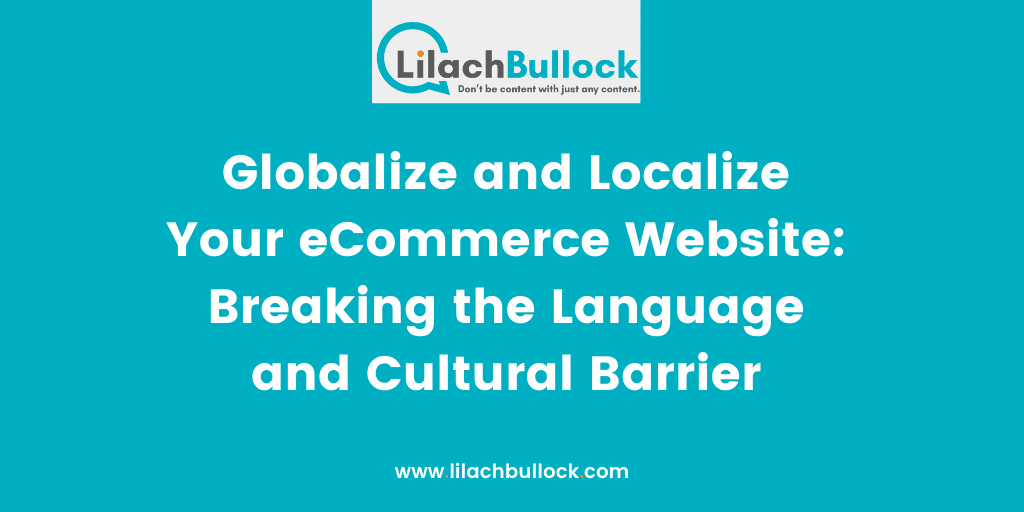Follow Lilach

Globalize and Localize Your eCommerce Website: Breaking the Language and Cultural Barrier
If you’re planning to market your products overseas, it’s likely you’ve heard the terms ‘globalization’ and ‘localization’ bandied about a fair bit. But what do these actually mean when it comes to your eCommerce website and why are they so important? Read on to discover the answers to both of these questions!
While assessing the benefits of globalization and localization, it’s also worth considering the risks. Localization fails can hit the headlines in a big way, delivering just the kind of publicity that companies don’t want. This means that website localization is more important than ever. We’ll look at this in more detail below too.
What Is Globalization?
There are a whole host of definitions out there for the word ‘globalization.’ They range from a focus on economic globalization (“the increase of trade around the world, especially by large companies producing and trading goods in many different countries” – Cambridge Dictionary) to one that also incorporates social and cultural elements (“a situation in which available goods and services, or social and cultural influences, gradually become similar in all parts of the world” – Cambridge Dictionary).
In simple terms, we can think of globalization as the process companies trading more easily around the world as cultural influences expand. The benefits of globalization for individual companies, when considered in these terms, are widespread. eCommerce platforms can enjoy increasing access to larger markets, to cheaper sources of labour and to cheaper materials from which to manufacture their products, thanks to the global nature of the marketplace. While a detailed discussion of the pros and cons of globalization is one for another day, suffice it to say that globalization presents plenty of opportunities to savvy businesses that are looking to boost their sales figures.
What Is Website Localization?
At once a part of globalization and also seemingly opposite to it, localization is the process of shaping content to suit the expectations of a particular, ‘local’ audience. Website localization is the clearest example of this. It means shaping your eCommerce site to suit users in different countries, providing each user with an experience that makes them feel as though the site was developed specifically for their country/language.
How Does Website Localization Work?
If you’re looking to localize your website, it’s important to understand what the process entails and why, so that you can enjoy the full benefits of localizing your site. It all starts with a good translation company. They will be able not just to translate website content, but also to support all of the aspects of the localization process.
That localization process covers everything from technical and practical details, such as coding, text direction and payment systems, to imagery, colours, and iconography. A translation company specialising in overseas digital marketing will be able to guide your business through every aspect, helping you to localize your site in order to have maximum impact on the target audience.
Why Are Globalization and Localization So Important?
The result of expert localization and translation services is that businesses can reach out to global audiences in the right way. Achieving success in a global marketplace means connecting with customers at a local level. This is what eCommerce platforms can accomplish when they combine globalization with localization in the right way. Customers feel engaged with the brand and buy in to the company as a whole, as well as the products.
Breaking Down Language Barriers
A key part of website localization is breaking down language barriers between different countries. This starts with a good translation company, but it’s about more than just converting one language to another. Content writing for websites, blog posts and more tends to include a wide range of local expressions and colloquialisms. During the language translation part of the localization process, these phrases are exchanged for appropriate local expressions in the target language.
It takes an expert linguist to deliver content that reads as though it was written in the target language. This is where professional translation services come in. When you translate Spanish to English, for example, it’s essential to translate Spanish colloquialisms not just directly but into equivalent English phrases.
A translator needs to be fluent in both languages in order to pull this off effectively. This includes an appropriate regional focus. After all, Latin American Spanish and the Spanish used in Spain use different expressions, just as US and UK English do.
Using a language professional who isn’t quite fluent in both languages simply won’t suffice. And let’s be clear – when we’re talking about fluency, this incorporates everything from idioms to current slang. Failing to cover these can result in embarrassing mistakes. Like Honda’s launch of the ‘Fitta’ model in Sweden, where ‘fitta’ is a coarse term for female genitalia. Or HSBC’s global slogan that skewed from ‘assume nothing’ to ‘do nothing’ during the translation process.
Globalization Versus Localization
For businesses that are looking to benefit from globalization, it’s important to blend a global approach with high quality localization services. Whether the company is using website translation services, content writing services, marketing outreach services or anything else, it needs to be part of a planned, coherent strategy.
With all globalization and localization projects, it’s wise to work with an experienced translation company and to lean on that company for guidance. After all, any website translation company worth its salt will have a wealth of experience to draw on when it comes to globalization and localization.
As a general rule, pushing for globalization is important when it comes to expanding your global footprint. However, that’s not at the expense of localization. A successful global business needs to deliver on both fronts, delivering content that appeals to audiences around the world in broad terms, while also connecting with each audience in specific, local ways. Simple!

Follow Lilach















